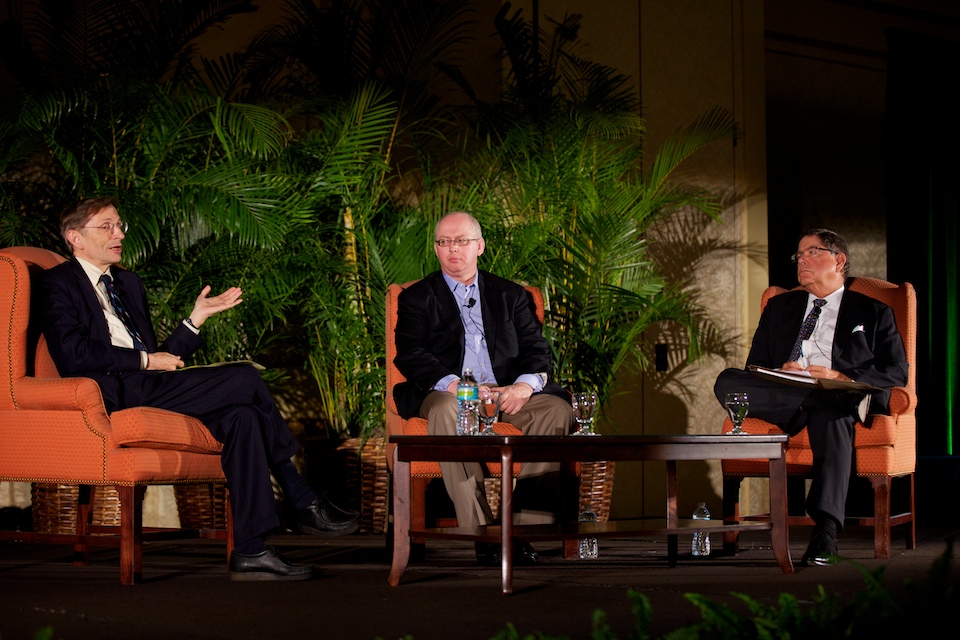
Exploring the future of social entrepreneurship
(l to r): Bill Drayton, Matthew Bishop and Alberto Ibargüen discuss social entrepreneurship
If social entrepreneurs have learned anything over the past several years, it’s that collaboration is the key to advancing social change. Success in the field will only come through partnerships between the social sector and the business world, Bill Drayton, CEO of Ashoka, told a crowd of leaders gathered in Miami this week.
The three-day Ashoka Support Network’s Global Summit, funded by Knight Foundation, is part of a larger discussion on how to best move social entrepreneurship forward, both locally in South Florida and also globally. During an opening conversation on the future of social entrepreneurship, panelists focused on how teams, and also “teams of teams,” can ensure a brighter, more successful future for the field. By doing so, social change leaders can help build a world where everyone has the ability to become a changemaker. Knight Foundation’s President & CEO Alberto Ibargüen welcomed the crowd by saying that Miami is a “fantastic” place to talk about where the field is headed, citing its unique diversity as central to the conversation around entrepreneurship: “75 percent of us were born someplace else and over 50 percent of us are from another country.” It’s a community where people express their opinions, where debate is constant and the discovery of other points of view is commonplace, he said. The important thing to remember about the field of social entrepreneurship and its future, Drayton said, is that we’re living in a time where change is escalating exponentially. It’s important to acknowledge that it is the people themselves who are making that change happen, he said. “Suddenly change is the game…but that can be much harder than it sounds. We don’t want to do this with just one or two percent of people [who] can help create change, that would be considered a failure. We want to live in a world where every single person has the ability to be a changemaker.” Drayton said to do that, you have to build teams and even “teams of teams” to make it possible. Drayton believes that element of collaboration is a key piece of the puzzle moving forward and that collaboration lies at the heart of social entrepreneurship:
“If you’re going to make a city, country or any other geographic area a place where everyone is a changemaker, you have to have all the pieces in place and be able to weave them together. We’re learning how to do that…This summit is about helping the Miami teams work together to figure out how to do that better, and also to help Miami become a model for other places in the world.”
Building a community, any community, where social entrepreneurship can thrive is about the “three E’s,” Drayton said, envisioning what’s possible, enabling it to succeed and enforcing it within the community.
The panel also explored the impact of technology on entrepreneurship and its potential to ignite change. “If you look at where we are on a scale of one to ten when it comes to technological innovation, I think maybe we’re at a two,” said Ibargüen. “We’re just beginning to see how new inventions and tools like Twitter and Facebook are changing and defining how we communicate.”
Matthew Bishop, editor of the Economist, who moderated the discussion, likened social entrepreneurship to being bilingual: “It’s about knowing the language of business and understanding the language of social change.”
That’s precisely what Ashoka’s goal are in Miami, both here during this week’s summit and overall: “We want to join business entrepreneurs with social entrepreneurs, that’s my passion and that’s how we’ll get to creating sustainable change. We hope this week’s conference will be the tipping point of making that happen,” said Lorena García Duran, the director of Ashoka’s Miami office.
To learn more about why Ashoka decided to recently open an office in South Florida and what unique opportunities it sees for changemaking within the community, read Knight Foundation’s recent Q&A with García Duran.
Recent Content
-
Community Impactarticle ·
-
Community Impactarticle ·
-
Community Impactarticle ·


